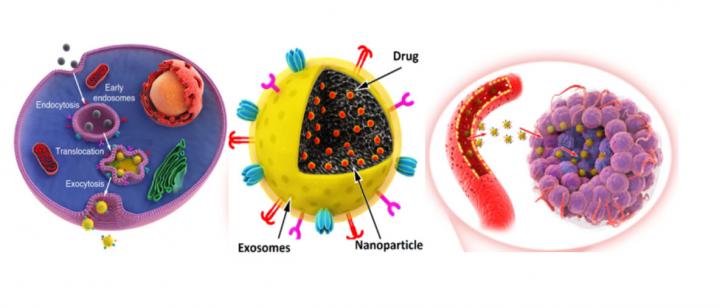Novel anti-cancer nanomedicine for efficient chemotherapy

The researchers have harnessed exosomes together with synthetic nanomaterial as carriers of anticancer drugs. Credit: Santos Lab
Exosomes contain various molecular constituents of their cell of origin, including proteins and RNA. Now the researchers have harnessed them together with synthetic nanomaterial as carriers of anticancer drugs.
The new exosome-based nanomedicines enhanced tumor accumulation, extravasation from blood vessels and penetration into deep tumor parenchyma after intravenous administration.
“This study highlights the importance of cell-based nanomedicines”, says the principal investigator and one of the corresponding authors of this study, Hélder A. Santos, Associate Professor at the Faculty of Pharmacy, University of Helsinki, Finland.
Nanoparticles-based drug delivery systems have shown promising therapeutic effcacy in cancer. To increase their targettibility to tumors, nanoparticles are usually functionalized with targeted antibodies, peptides or other biomolecules.
However, such targeting ligands may sometimes have a negative infuence on the nanoparticle delivery owing to the enhanced immune-responses.
Biomimetic nanoparticles on the other hand combine the unique functionalities of natural biomaterials, such as cells or cell membranes, and bioengineering versatility of synthetic nanoparticles, that can be used as an efficient drug delivery platform.
The developed biocompatible exosome-sheathed porous silicon-based nanomedicines for targeted cancer chemotherapy resulted in augmented in vivo anticancer drug enrichment in tumor cells.
“This demonstrates the potential of the exosome-biomimetic nanoparticles to act as drug carriers to improve the anticancer drug efficacy”, Santos concludes.
Media Contact
All latest news from the category: Health and Medicine
This subject area encompasses research and studies in the field of human medicine.
Among the wide-ranging list of topics covered here are anesthesiology, anatomy, surgery, human genetics, hygiene and environmental medicine, internal medicine, neurology, pharmacology, physiology, urology and dental medicine.
Newest articles

Sea slugs inspire highly stretchable biomedical sensor
USC Viterbi School of Engineering researcher Hangbo Zhao presents findings on highly stretchable and customizable microneedles for application in fields including neuroscience, tissue engineering, and wearable bioelectronics. The revolution in…

Twisting and binding matter waves with photons in a cavity
Precisely measuring the energy states of individual atoms has been a historical challenge for physicists due to atomic recoil. When an atom interacts with a photon, the atom “recoils” in…

Nanotubes, nanoparticles, and antibodies detect tiny amounts of fentanyl
New sensor is six orders of magnitude more sensitive than the next best thing. A research team at Pitt led by Alexander Star, a chemistry professor in the Kenneth P. Dietrich…





















